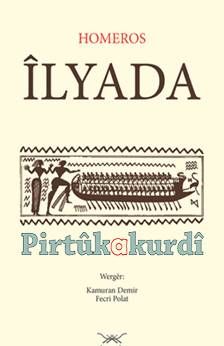Last remaining product:
0

Homeros İlyada
(0) Comment - 0 Point
Category
Author
Stock
0 Piece
Stock code
PX0000081
stock status
Out of stock
Publishers
Price
0,86 USD + VAT
*starting from 0,13 USD!
%20 discount
0,86 USD
0,69 USD
- Wergêr: Kamuran Demir, Fecri Polat
- "Ji Bo Bîranîna Dengbêjê Nemir Homeros û Homerosê Kurdan Evdalê Zeynikê"
Troy is the eternal capital of war, peace, resistance, East and West, born after a beauty contest. Home of brave heroes, poetry and words, Homer. The Anatolian city that agreed with dozens of different languages and hearts during the Achaean attack.
And the Iliad... One of the longest, oldest and most beautiful poems of world literature, integrated with the words of Homer about a relentless war.
In the Trojan War, laments and chants, cries of defeat and raider songs were in many languages, but the Iliad was in Kurdish nearly three thousand years later!
Kurdish, which has long completed its Renaissance, now needs Homer, and Homer's works are quite suitable for this language. A work like the Iliad, which was not satisfied with the limits of time for centuries and was a product of oral tradition, had to be presented to Kurdish, one of the languages with the world's largest oral literature. There is a remarkable similarity between the two traditions. Both traditions (Kurdish dengbêjlik and Homeric dengbêjlik) have traveled similar fates. On the one hand, a language that tries/has to explain its history, culture, existence, proverbs, and chiroks through balance, and to make it exist in this way due to the opportunities it has...
On the one hand, an epic tradition that has been continued for centuries through oral narration and transmission. It is noteworthy that both traditions continue in the Anatolian geography and that laments, enthusiasm and fears come to the fore with very similar and powerful expressions in both traditions.
The belief that the Anatolian oral narrative tradition, which started with Homer, continues today under the name of Dengbêjlik, and the necessity of building a bridge between the languages and traditions that lived in Anatolia with the responsibility left by this belief, passed to a new stage with the translation of the Iliad into Kurdish.
| Publisher | : | Heyamola Publications |
Be the first to review this product!
Güzel
B... G... | 18/10/2025
Gayet güzel sorunsuz işkeyen bir sistem
Zübeyir Kaya | 17/10/2025
Her zaman güvenerek alışveriş yaptığım bir site.
D... E... | 03/10/2025
Her zaman güvenerek alışveriş yaptığım bir site.
D... E... | 03/10/2025
İyi beğendim
pratik cocuk etkinlikleri | 18/09/2025
İyi güzel
pratik cocuk etkinlikleri | 18/09/2025
Sitenizi çok beğeniyorum. Başarılar
S... A... | 29/07/2025
Ömer Aksoy | 25/07/2025
Kovareke giranbiha
O... K... | 30/05/2025
Kürtler için yapılmış güzel şeylerden bir tanesi
M... A... | 16/04/2025


